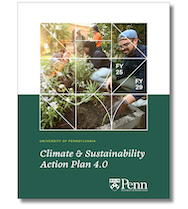Our Plan
100% carbon-neutral by 2042
Penn's Climate & Sustainability Action Plan (CSAP) is our roadmap to a cleaner future.
Outlining the steps forward to achieve our University’s ambitious environmental sustainability goals, CSAP challenges the ingenuity and commitment of Penn. One such goal, a 100% carbon-neutral campus by 2042, is audacious yet achievable through the many programs and initiatives championed by Penn Sustainability.
The CSAP would not be possible without the unwavering commitment of our faculty, students, and staff in solving environmental issues. Every five years a new update to the original Climate Action Plan (circa 2009) is released. And, benchmarks and expectations grow with every new plan released.
Climate & Sustainability Action Plan 4.0
The fourth iteration of Penn’s Climate and Sustainability Action Plan (CSAP) marks a milestone in our evolution as one of the world’s premier teaching and research institutions for sustainability. Building on our legacy, CSAP 4.0 reflects Penn’s continued commitment to advancing environmental scholarship, fostering innovative policies, and adopting best practices to enhance campus efficiency and reduce emissions.
CSAP 4.0 integrates sustainability and climate-conscious design across Penn’s campus, operations, and management, while expanding goals for teaching and scholarship in climate, the environment, and sustainability. It builds on the successes of earlier plans—CSAP 1.0 (2009), 2.0 (2014), and 3.0 (2019)—to address the rapidly changing environmental landscape.
Key Features of CSAP 4.0

- Alignment with the University of Pennsylvania Health System’s inaugural sustainability plan.
- Inclusion of civic engagement sustainability goals.
- Expansion of scope beyond the West Philadelphia academic campus to encompass:
- University of Pennsylvania Health System
- Morris Arboretum
- New Bolton Center
- Penn-owned real estate properties
This comprehensive plan sets ambitious 2024-2029 goals, blending measurable targets such as carbon emissions reductions with the development of new initiatives to drive progress over the next five years.
Join the movement
Penn's plan pushes our community to innovate and shrink our ecological footprint. We prioritize environmental health and resilience, aiming for a remarkable 100x42 carbon neutrality pledge.
With our resources, expertise, and dedication, this audacious goal is within reach. The CSAP 4.0 turns ambitions into action and shared values into accomplishments. Together, we can secure a sustainable future.
Join the movement
Penn's plan pushes our community to innovate and shrink our ecological footprint. We prioritize environmental health and resilience, aiming for a remarkable 100x42 carbon neutrality pledge.
With our resources, expertise, and dedication, this audacious goal is within reach. The CSAP 4.0 turns ambitions into action and shared values into accomplishments. Together, we can secure a sustainable future.
